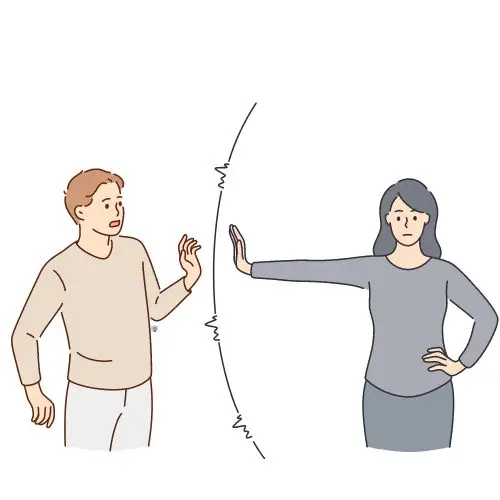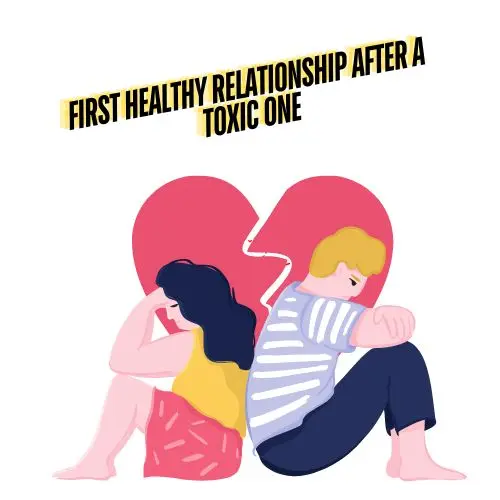Introduction
Ending an unhealthy relationship can be emotionally draining but also provides an opportunity for growth. Establishing new dynamics built on sincerity, care and respect sets the stage for flourishing. This article examines signs that signify when past patterns repeat or progress occurs. Statistics, tips for overcoming baggage, and maintaining healthy boundaries guide embarking on fulfilling connections. With understanding and effort, each experience enhances the capacity for nurturing relationships and staying true to oneself.
Table of Statistics on Relationship Health:
- 61% of divorced individuals remarry, while 45% of divorces involve second or later marriages. (CDC)
- Only 25% of remarriages last longer than first marriages. Success rates tend to increase the longer one remains single before remarrying. (Bowling Green State University)
- Those who report learning and improving relationship skills after a breakup have a 40% greater chance of marital success if remarrying than those not making changes. (ACH Child & Family Institute)
- The divorce rate for third marriages is 73%, rising to nearly 90% for fourth marriages. (Bowling Green)
- Couples who openly communicate, resolve conflicts respectfully, share responsibilities and spend quality leisure time together have the greatest chances of long-term happiness. (Gottman Institute)
Recognizing Signs a Past Relationship Was Toxic:

- Physical/emotional abuse threatening safety and autonomy was present.
- Partner was hypercritical, gaslighting reality or denigrating self-esteem to induce codependency.
- Isolation from friends/family, constant emotional drama or controlling behaviors exerted influence and power over decisions/choices.
- Needs/feelings were routinely dismissed or invalidated through a lack of active listening or support provided.
- Favoritism is shown to others’ wants over fulfilling basic relationship obligations like honesty, affection, quality attention and equity in household labor.
- Anxiety, depression, or trauma-type symptoms emerged over prolonged exposure to unhealthy dynamics, preventing fulfilling life pursuits.
- Apologies held more sincerity for getting caught versus expressed care, regret and willingness to remedy problems permanently through changed behaviors.
With some reflection on patterns enabling toxicity to emerge or continue, individuals gain awareness, helping set healthier expectations and engaging in future relationships. Knowing what feels right versus distressing guides internal boundary-setting.
Signs a New Relationship Promotes Well-Being:

- Mutual care, respect and trust feel authentically reciprocated within interactions.
- Compromise aids conflict resolution constructively versus blaming, defiance or passive aggression.
- Both parties feel empowered to share vulnerabilities while maintaining individuality and personal autonomy.
- Quality communication listens actively rather than interrupting while problems are addressed transparently.
- Physical/emotional intimacy enhances attachment, whereas in past relationships caused discomfort, used coercively or transactionally.
- Happiness, motivation, and self-esteem increase rather than mental/physical health declining over time like before.
- Conflicts addressed privately respectfully rather than weaponized socially or to intimate support systems causing divided alliances.
- Flexibility accommodates life changes versus attempts to control partners’ time, interests or personal freedoms threatening independence.
When these signs consistently characterize interactions in a new relationship, chances improve for fulfilling dynamics replacing past toxicity. However, vigilance guards against unhealthy patterns resurfacing requiring directly addressing issues or ending involvement for personal well-being if problems recur.
Overcoming “Baggage” from Past Toxic Relationships:
While understandable after enduring unhealthy partnerships, carrying resentments or relationship fears into new bonds strains forming trust and intimacy. Some strategies allowing positivity instead include:
- Journaling helps process emotions without blaming partners for past mistakes outside their control.
- Counseling provides objective feedback on relationship patterns plus tools like assertiveness training.
- Setting healthy boundaries prevents projecting insecurities while maintaining autonomy respected by new partners.
- Recognizing each person and dynamic as unique discourages generalizing all future relationships as necessarily toxic based on one experience.
- Expressing needs respectfully helps caring partners accommodate love languages instead of expecting toxicity to recurrence.
- Validating partners’ humanity beyond perceived flaws sees them complexly with nuance versus stereotypes formed by unhealthy pasts.
- Forgiveness prioritizes mental well-being over resentments through understanding life’s learning lessons, sometimes taught harshly but made wiser going forward.
With self-reflection, improving relationship skills, and letting go of baggage holding progress back, those emerging from toxic bonds gain clarity in navigating fulfillment’s possibilities within new connections built earnestly on sincerity, care and mutual respect.
Maintaining Healthy New Relationship Boundaries:

While opening vulnerably deepens intimacy, oversharing certain private relationship issues risks portraying a neediness pressuring new partners or discouraging bonding organically versus our obligation. Maintain positivity by:
- Limiting comparisons mentioning past partners unless directly relevant and showing growth from hard-won wisdom applies prospectively.
- Not using a new date as a venting sounding board about exes unless balanced with happier current topics, too, bringing both closer through fun times together.
- Shielding details partners would be uncomfortable hearing yet feel obligated to respond to avoid hurting feelings like past traumas or graphic sexual histories.
- Pacing self-disclosures appropriately based on readiness within new dynamics cultivating care versus meeting needs through someone not emotionally invested yet in that deep capacity.
- Honoring both is right not becoming relationship counselors for unresolved ex-partner issues by working through emotions independently whenever possible.
- Expressing fondness and being fully present versus being distracted by answering phones/texts from past attachments still demands attention, diverting focus away.
Setting healthy expectations and consistently demonstrating care through sincerely engaged listening elevates new bonds organically versus burdensome requirements, easing fears based on toxicity previously endured alone. Mutual care thus blossoms.
First Time Experiencing Care, Respect and Trust:
The discernable differences in feeling safe, supported and fulfilled within healthy relationships contrast starkly with toxicity’s familiar yet draining patterns. Savouring life’s beautiful moments freely shared uplifts spirits:
- Accepting compliments or acts of service without counteracting self-deprecation from ingrained low self-worth habits feels empowering over time.
- Expressing needs honestly receives understanding versus defensiveness, normalizing toxicity’s absence reassuringly.
- Problems addressed respectfully through cooperation, not conflict, invite healing where blame and resentment reigned toxicly before.
- Memories form happy times together rather than drama stressing alone afterward as normal.
- Intimacy brings affection’s pleasures without objectification, control or transactional expectations attached vulnerablely like past harms.
- Self-esteem blossoms, recognizing one merits care, respect and trust authentically as a whole person—not conditionally based on fulfilling another’s desires alone.
With each caring interaction reaffirming healthy relationship capacities, those emerging from past toxicity rebuild security within themselves and connections no longer defined by harm alone. Hope opens possibilities never known but nourishing well-lived lives.
Commitment to Growth and Fulfillment:

While new beginnings emerge from endings teaching life’s hardest lessons, darkness solely bears light’s contrast. Maintaining relationship health requires transparently:
- Addressing problems respectfully through cooperation versus blaming, restoring intimacy and trust and overreacting defensively.
- Learning continuously through counselors aids skills like assertiveness, communication and addressing needs constructively.
- Forgiving mistakes graciously while exercising wisdom when toxicity resurfaces, requiring directly solving issues or ending toxic patterns recurring threaten wellness again.
- Prioritizing mental, emotional and physical caretaking through enjoying life’s pleasures together boosting spirits alongside challenges faced as a team.
- Cultivating gratitude wherever found enriching each day, acknowledging relationships as learning partnerships versus ownership, transferring resentments from the past onto the present, and bonding new ground.
With commitment honoring growth beyond toxicity defined, those journeying from unhealthy bonds build fulfilling lives surrounded by care, respect and trust within and between connections continuously urging life’s greatest rewards. Darknesses become but contrast illuminating light’s guiding humanity’s everyday steps closer to advancing together in goodness wherever found.

